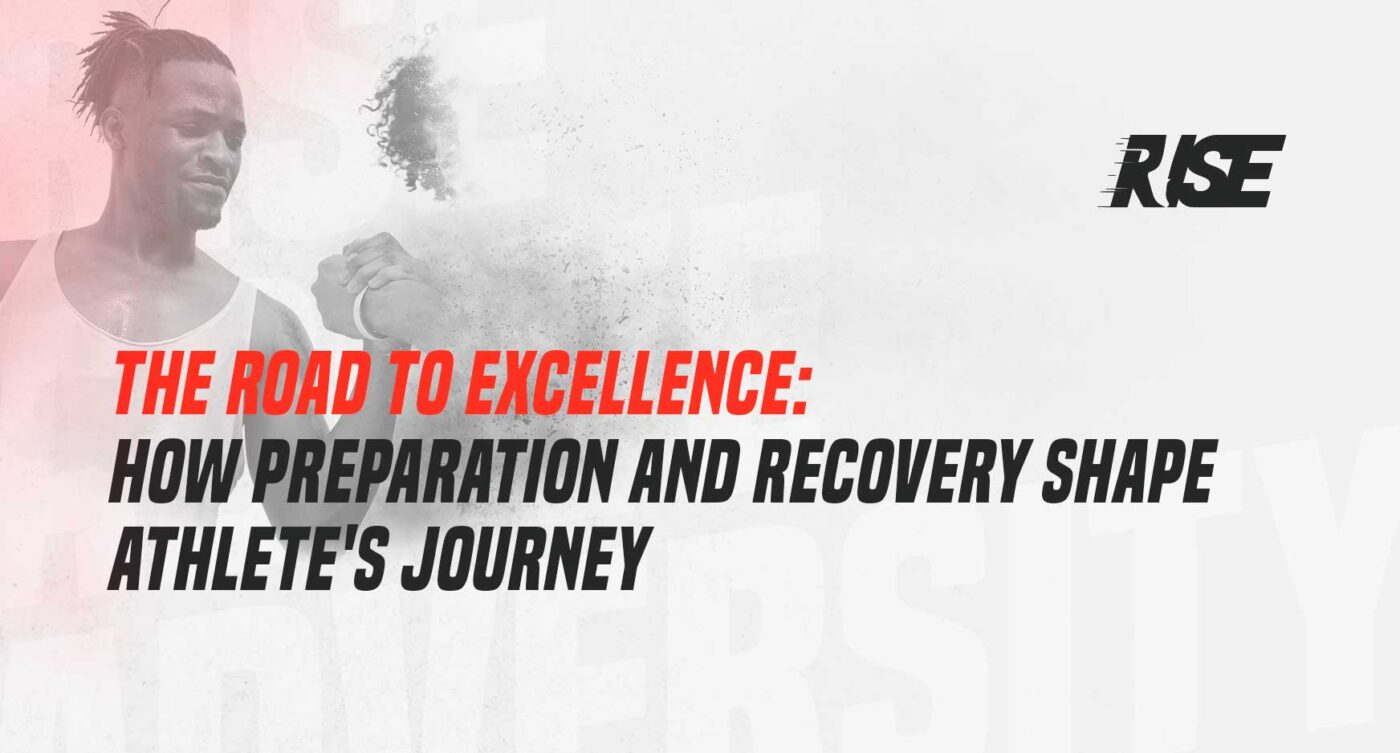As many sports prepare to wind down competition moving closer to the holiday season, it is important for athletes to mentally and physically recover their minds and bodies so they can hit the ground running in 2023.
By no means, does this mean completely removing yourself from skill workouts, gym workouts, or team workouts – but there is a cause to decrease the amount of stress put on both the body and the mind to have you feeling sharp, fresh, and focused for season 2023.
For many professional athletes, this may come in the form of surgeries, physio, and massage, or getting away on vacation with family and friends, etc. But for the aspiring, up-and-coming athlete this can become quite an expensive ordeal.
“Recovery is an essential part of any successful athlete’s routine. It is in the rest that the body and mind rebuild, adapt, and ultimately become stronger.” – Shalane Flanagan
Recovery is something that can’t be understated. It is the restoration of physiological and psychological processes that allow you to compete or train again at peak levels. Below are 5 ways that you can incorporate recovery strategies into your schedule without spending a cent.
1. Restoration Techniques:
There are a number of ways that athletes can use relaxation techniques to restore both the mind and the body. The impact upon which relaxation techniques are best suited will be unique to each individual athlete. Relaxation techniques might come in the form of reading a book, watching TV or movies, or maybe listening to music just to name a few. The best relaxation techniques reduce cortisol (stress hormone) and energize the mind and body.
2. Functional Restoration Techniques:
Functional relaxation techniques can be categorized as mind-to-muscle techniques. These techniques train you to become more conscious of levels of tension in the body and control your ability to release tension. This can be done through meditation, visualisation, or conscious breathing techniques (such as breathwork or yoga).
Functional relaxation techniques help you first relax the mind which then sends a message to the body to relax, calm, and compose through releasing muscle tension and removing adrenalin. Not only are they great recovery techniques but they can be used in preparation for training and competition as well.
3. Sleep Preparation Routines:
Sleep is the most vital recovery mechanism. In fact, your body can only go so long without sleep before it starts to shut down and your mind starts to hallucinate. Sleep is an in-built recovery mechanism that regenerates, repairs, and restores both mind and body in order to return it to its optimal state. 7-9 hours of adequate sleep allows the mind and body to recover and adapt to the physical, neurological, emotional, and immunological stressors of training and sports performance.
Understanding the impact that sleep has on recovering the body and mind, adopting a pre-sleep routine can assist in optimizing not only the amount of sleep you get but also the quality of sleep that you get. A pre-sleep routine allows the body and mind to relax, rest, and then sleep. The way to do this best is to have consistent wake-up and bedtimes, reduce the exposure to external stimulation (phone, TV, etc.), and use relaxation techniques (such as those mentioned above) to gradually calm and ground yourself. The ability to fall asleep will come more easily, once you are comfortable, restful, and in a present state.
4. Rest Days:
With the amount of stress that can be put on your body and mind through training and development, having at least one non-training day can help you feel fresh when returning to the track. Rest days allow you to focus on activities outside of your sport which rejuvenate both body and mind to return you to a motivated, focused, stronger, optimised state.
While laying on the couch all day watching movies or reading a book has its place in recovery too, the human body isn’t designed to stay still. Using passive physical movements such as stretching, walking, yoga or some cold therapy can assist in making the transition back to training smoother and recovery faster. A great way of recovering both mind and body is to get out into nature and allow your senses to take in the natural surroundings. This allows you to be completely present in your rest day which will help boost recovery.
“Rest is the most important part of training. Without proper rest and replenishment, you can’t reach your full potential” – Serena Williams
5. Reflection or Flow Journaling:
Journaling is a significant recovery tool that can help us analyze our thoughts, self-talk, and stories for what they really are. Journaling helps us process the emotions attached to the narratives we believe to be true. With so many of our thoughts lying below the surface of the conscious mind, journaling allows us to dig deep into our subconscious and see our thoughts in real time.
Another powerful strategy of journaling can help is to reflect on how far you’ve come. In this fast-paced society, we are always looking ahead toward the next big goal. The problem is sometimes that constant grind can lead to burnout. Reflecting on how far you’ve come actually has huge benefits in boosting the motivation to continue to work hard towards your dream.
Celebrating the small wins along the journey can play a major role in where you are headed. When we celebrate our achievements, no matter how big or small, we release the feel-good-neurochemicals into our system that make us want to repeat the action to experience more of the good. It is the same response that causes addiction.
People smoke cigarettes, take drugs, drink alcohol to make them feel good. And then repeat the action over and over because it makes them feel good. Well, reflection can work in the same way but in a more positive and sustainable response. Essentially you can become addicted to the journey which holds excellent opportunities ahead.
Reflection also prepares us for what’s ahead. We learn more about our response to challenges and the lessons that come about from our journey so far, to better equip us for challenges ahead. Reflection ignites the next step.
So, as the year 2023 comes to an end, here are some end-of-season POWER questions you can ask yourself that can help you celebrate the year and prepare for the next.
- What were my 3 biggest personal wins this year?
I like to compare this to when they play the Billboard top songs of the year on music channels in December and you totally forget about some of those bangers that came out in the first few months. Our last achievement is fresh in our mind, but sitting down and reviewing your achievements over the year allows you to gain a better perspective on how much you’ve grown as a person and as an athlete. This better understanding of yourself and what you have achieved also breeds confidence and motivation within.
“Reflection is an athlete’s compass. It guides us on the path to improvement and empowers us to become the best version of ourselves in the next season” – Stephen Curry
- What were my 3 greatest challenges this year?
We all face adversity in one instance or another. Challenges give us a better understanding of ourselves and what we need to work on. In the same way that you can’t have a day without night, sunshine without rain, and good days without bad days, we can’t experience the highs without the lows in sports. In fact, it’s the lows that build character and resilience and aid us through the next challenge. Every challenge prepares you for the next.
- What were my 3 substantial lessons this year?
Growth isn’t just about what you achieve but what you learn along the way. It’s the lessons that help you gain the knowledge to work through the next challenge. It’s the reason why veterans in their sport can keep playing long after their speed and athleticism have passed. Knowledge put into action is power. The only way to get clear on the action is to get clear on the knowledge. Reflecting on our lessons creates clarity in the mind and prepares the next step to take.
- What is my BIG picture goal for 2024?
This goal will be aligned with the direction of what you want to ultimately achieve. Maybe it’s making a certain team or something more individual-based, but it’s too important to get clear on what exactly you want to work towards and then plan how you will get there.
What work do you need to be doing to reach this goal? When are you going to put the time into it? Where can you put the work in? How can you make this achievable? How can you measure your progress? Who do you need to make this possible? What strengths will help you and what weaknesses must you strengthen? To make progress you need direction.
- What will be my 3 non-negotiables for 2024?
In other words, how can I create the discipline to achieve my goal? What values will I hold strong to in order to make this happen? Non-negotiables create focus, discipline, resilience, and commitment and build strong habits that increase the speed of growth.
Not only does this create stronger, more decisive behaviours in the direction of what you want to achieve but it develops that mental toughness muscle along the way. Your mind will naturally try and make a million excuses of why you should just stay comfortable where you are, cut through the noise with 3 non-negotiables.
“Non-negotiables are the principles you refuse to compromise. They keep you focused, disciplined, and on the path to greatness as an athlete.” – Tom Brady
- What is my 2024 Mantra?
The word mantra can be broken into two parts. ‘Man’ which means mind. And ‘tra’ means transport or vehicle. A mantra is a sound vibration through which we mindfully focus our thoughts. This can be as simple as a word, a quote, a song lyric, or a phrase. A mantra creates inspiration and direction for the mind which helps us stay true to our path. Putting together a mantra for season 2022 must hold strong meaning and be unique to you. Aligning a mantra with your goals and non-negotiables can hold incredible power in achieving what you set out to in 2024.
There will be many athletes who will vacate their dreams and goals over this holiday period and put them on the back burner. Besides, why wouldn’t they? Nobody’s checking in on them.
But for those who want to make season 2024 their best year ever… I know they’ll be working. You don’t need to get ready if you stay ready. Recovery and preparation are paramount!! Restore the body. Sharpen the mind.
What type of athlete will you be at the start of next season? The choice is yours.
– 𝒞ℴ𝒶𝒸𝒽 𝒞𝒶𝓁.

